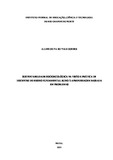Sustentabilidade socioecológica na visão e prática de docentes do ensino fundamental rumo à aprendizagem baseada em problemas

Visualizar/
Data
2021-09-17Autor
Guedes, Alline Silva do Vale
http://lattes.cnpq.br/5589980115871719
Metadado
Mostrar registro completoResumo
Education on socio-ecological sustainability needs to be present in the curriculum and in the
teaching practice of basic education in view of the current planetary emergency that we are
experiencing. However, it was noticed in the available scientific literature that this approach to
sustainability is limited in the curricula and, mainly, in the practices of elementary school
teachers. There is a school teaching-learning centered on traditional methodologies, when the
use of active methodologies, such as problem-based learning (PBL), could appear as an
alternative towards the construction of a more sustainable present and future for all, as the 2030
Agenda points out. This study aimed to analyze the sustainability concepts and approaches of
teachers in a public elementary school, located in Natal-RN, aiming at proposing active
strategies for teaching-learning processes through PBL. This is a descriptive and qualitative
study, also considered as applied because it proposes a didactic guide for teachers. A data
collection was carried out with 15 professors of the institution through an online questionnaire
via Google Forms. Based on theoretical support, data analysis was performed using Bardin's
content analysis technique. The research shows that teaching practice has not critically
addressed the socio-ecological sustainability in the classroom, thus requiring the continued
education of teachers and/or the proposal of more active and innovative teaching materials. For
this study, a didactic training guide on PBL was proposed to the institution's professors, focused
on the theme of socio-ecological sustainability, involving the use of an online resource known
as WebQuest. For content validation, eight judges, through an online questionnaire via Google
Forms, evaluated the didactic guide using five effectiveness components related to the content
of the material. To classify the items of the assessment instrument as valid, a Content Validation
Index (CVI) of at least 0.80 was considered. The didactic guide showed satisfactory validation
evidence (CVI = 0.97). It is concluded that, although there are challenges in implementing the
PBL method, teachers were willing to implement socio-ecological sustainability through the
use of this active methodology. It is understood that teachers need to be increasingly trained so
that they can more dynamically address more sustainable lifestyles in the classroom. The
proposed didactic guide can be a support tool for teachers in building a more critical and
creative learning on sustainability issues that prioritize the social and ecological dimensions.



